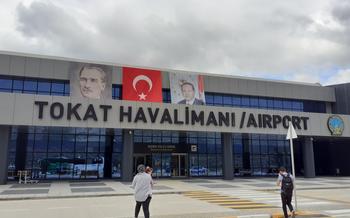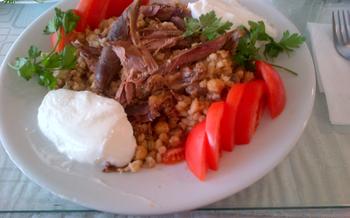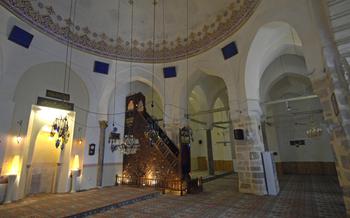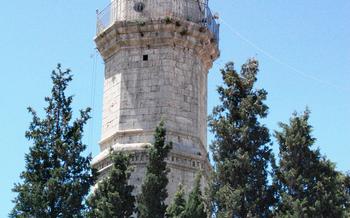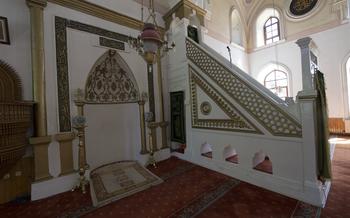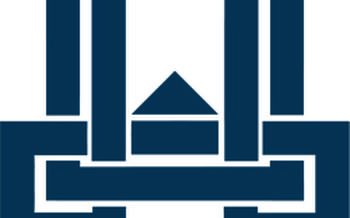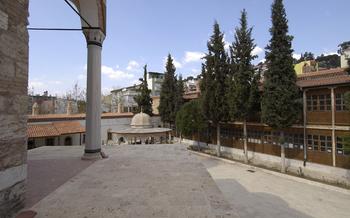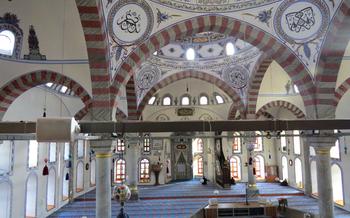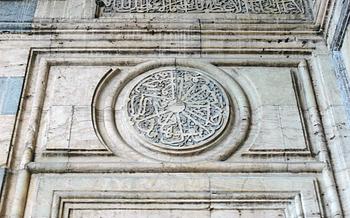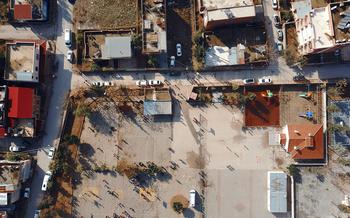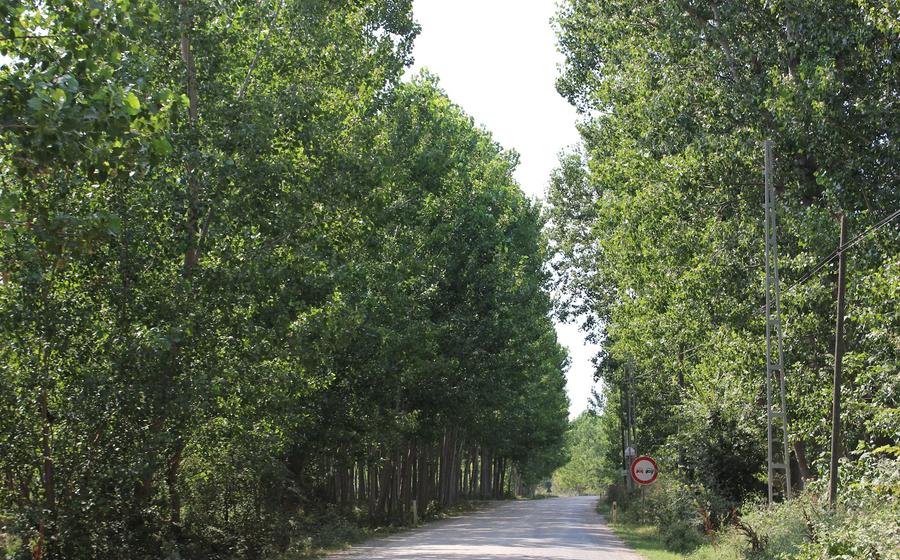
Meydan Camii (Square Mosque)
- Interior Design and Decorations
- Religious Importance
- Visiting Hours and Dress Code
- Photography and Videography
- Accessibility and Transportation
- Local Customs and Etiquette
- Nearby Attractions
- Food and Accommodation
- Shopping and Souvenirs
- Health and Safety:
- Insider Tip:
Interior Design and Decorations
The interior of the Meydan Camii is a testament to the artistry and devotion of its builders. The prayer hall is spacious and airy, with rows of columns supporting a series of domes that flood the space with natural light. The mihrab, or prayer niche, is the focal point of the hall, intricately carved with verses from the Quran and adorned with colorful tiles. The minbar, or pulpit, is also a masterpiece of craftsmanship, with its intricate woodwork and inlaid mother-of-pearl.
The walls of the mosque are adorned with intricate tilework and calligraphy, creating a mesmerizing visual tapestry. The tiles feature geometric patterns and floral motifs, while the calligraphy includes verses from the Quran and the names of Allah and the Prophet Muhammad. The overall effect is one of awe and inspiration, creating a serene and spiritual atmosphere that invites contemplation and prayer.
Religious Importance
The Meydan Camii holds immense religious significance for Muslims worldwide, serving as a sacred place of worship and a symbol of faith. Daily prayers, including the five obligatory daily prayers, are held within the mosque, where the faithful gather to offer their devotions to Allah. Special religious ceremonies, such as the Friday congregational prayer, are also conducted, attracting a large number of worshippers.
Beyond daily prayers, the Meydan Camii serves as a center for Islamic education and community gatherings. Classes on Quranic studies, Islamic history, and religious practices are often held within the mosque, providing opportunities for Muslims to deepen their understanding of their faith. The mosque also hosts various community events, including lectures, workshops, and social gatherings, fostering a sense of unity and belonging among the Muslim community.
During religious festivals and celebrations, such as Ramadan and Eid, the Meydan Camii becomes a focal point for communal celebrations. During Ramadan, special night prayers, known as Tarawih, are held, and the mosque is adorned with festive decorations. On Eid, Muslims gather in large numbers to offer Eid prayers and exchange greetings, creating a vibrant and joyous atmosphere.
Visiting Hours and Dress Code
The Meydan Camii, like many other mosques in Turkey, adheres to specific visiting hours and dress code requirements to ensure respect for Islamic customs and traditions. Visitors are welcome to visit the mosque during designated hours, which typically fall outside of prayer times. It is crucial to check the mosque's official website or inquire locally for the exact visiting hours to avoid any inconvenience.
When visiting the mosque, visitors are expected to dress modestly, covering their shoulders and knees. Women are required to wear a headscarf as a sign of respect for the religious customs. Appropriate clothing options for men include long pants and a shirt with sleeves, while women can opt for long skirts or dresses paired with a headscarf. Visitors should avoid wearing revealing or tight-fitting clothing.
Upon entering the mosque, visitors are recommended to remove their shoes and place them in the designated shoe racks. It is considered disrespectful to walk inside the mosque with shoes on. Visitors should also be mindful of their behavior, maintaining a respectful and quiet demeanor while inside the mosque. Taking photos or videos is generally allowed, but it is essential to be respectful of other visitors and avoid using flash photography or tripods.
Photography and Videography
The Meydan Camii is a popular tourist attraction, and many visitors are eager to capture its beauty through photography and videography. However, it is important to be respectful of the religious significance of the mosque and to follow the regulations regarding photography and videography.
Visitors are generally allowed to take pictures and videos inside the mosque, but there are some restrictions. Flash photography and tripods are not permitted, as they can be disruptive to worshippers. It is also important to be mindful of other visitors and to avoid taking photos or videos that could be considered intrusive or disrespectful.
When taking pictures or videos, it is important to focus on the architectural features and the overall atmosphere of the mosque. Avoid taking photos of people without their permission, and be respectful of the privacy of worshippers. By following these guidelines, visitors can ensure that they have a positive and enjoyable experience at the Meydan Camii.
Accessibility and Transportation
The Meydan Camii is accessible to visitors with disabilities, featuring ramps and elevators to ensure easy movement throughout the mosque. Wheelchair users can navigate the premises without any hassle, allowing them to fully experience the grandeur of this architectural masterpiece.
To reach the mosque, visitors have several transportation options. Public transportation, including buses and trams, offers convenient access to the Meydan Camii. The nearest bus stop is just a short walk away, making it easy to hop on and off. Taxis are readily available in Tokat, providing a comfortable and direct route to the mosque. Rental cars are also an option for those who prefer the freedom to explore the city at their own pace.
The most convenient way to get to the Meydan Camii from the city center is by foot. The mosque is located within the historic district of Tokat, and the walk offers an opportunity to admire the surrounding architecture and soak in the vibrant atmosphere of the city.
Local Customs and Etiquette
When visiting the Meydan Camii, it is important to be mindful of local customs and etiquette to show respect for the religious sentiments of the community. Visitors should dress modestly, covering their shoulders and knees, and avoid wearing revealing or tight clothing. Shoes must be removed before entering the mosque, and there are designated areas for storing footwear. Upon entering, visitors should greet other worshippers with a friendly "Merhaba" (hello) and avoid talking loudly or disturbing those who are praying. It is customary to perform a two-step ablution (wudu) before entering the prayer hall, and there are facilities for this purpose near the mosque. Visitors should also be mindful of their body language and avoid pointing their feet towards the qibla (direction of prayer). When taking photos or videos, it is important to ask for permission and be respectful of other visitors' privacy. By following these simple guidelines, tourists can contribute to a peaceful and welcoming atmosphere within the mosque.
Nearby Attractions
In addition to the historical and religious significance of the Meydan Camii, Tokat offers a wealth of other attractions and landmarks that tourists can explore. The city is home to several museums, including the Tokat Museum, which houses a collection of artifacts and exhibits showcasing the region's rich history and culture. The Tokat Archaeology and Ethnography Museum is another must-visit, showcasing a diverse range of archaeological findings and traditional artifacts.
Visitors can delve deeper into the city's heritage by exploring its historical neighborhoods, such as the Tokat Castle and the Old City. These areas offer a glimpse into the city's past, with narrow cobblestone streets, traditional Ottoman-style houses, and historical landmarks.
Nature enthusiasts can escape the hustle and bustle of the city by visiting the Tokat Botanical Garden, which features a diverse collection of plants and flowers from around the world. The garden provides a tranquil oasis for relaxation and exploration.
For those seeking a unique cultural experience, the Tokat Bazaar is a vibrant marketplace where visitors can find a variety of local handicrafts, souvenirs, and traditional Turkish delights. The bazaar is a great place to interact with locals and immerse oneself in the city's vibrant atmosphere.
By combining a visit to the Meydan Camii with these nearby attractions, tourists can gain a comprehensive understanding of Tokat's rich history, culture, and natural beauty.
Food and Accommodation
After immersing yourself in the spiritual and historical significance of the Meydan Camii, take a break to savor the delicious flavors of Tokat's culinary scene. Just a stone's throw from the mosque, you'll find an array of restaurants and cafes offering a tempting selection of traditional Turkish dishes. Indulge in the aromatic kebabs, tantalizing pide (Turkish pizza), or the rich flavors of keşkek, a hearty dish made from wheat, meat, and yogurt.
For a truly authentic experience, venture into the local markets or bazaars, where you can find an array of fresh produce, spices, and handmade goods. Here, you can bargain with friendly vendors and pick up unique souvenirs, such as intricately woven carpets, hand-painted pottery, or shimmering jewelry. By supporting local artisans, you'll not only take home a piece of Tokat's culture but also contribute to the sustainability of the community.
Accommodation options near the Meydan Camii range from charming guesthouses to modern hotels. For a budget-friendly stay, opt for a cozy guesthouse where you can mingle with locals and experience Turkish hospitality firsthand. If you prefer the comforts of a hotel, there are several options within walking distance of the mosque, offering a range of amenities to suit your needs.
Shopping and Souvenirs
Tokat offers a vibrant shopping experience, allowing visitors to immerse themselves in the local culture and take home unique souvenirs. The city is renowned for its traditional handicrafts, carpets, pottery, and jewelry. The local markets or bazaars, such as the Tokat Pazarı, are a treasure trove of authentic souvenirs. Visitors can bargain with local vendors to get the best prices and support the local economy.
When shopping for carpets, look for intricate designs and high-quality materials. Tokat is known for its unique carpet-making techniques and vibrant colors. Pottery enthusiasts can find a variety of handmade ceramics, from decorative plates to functional bowls and vases. The Tokat pottery is often adorned with intricate patterns and motifs inspired by local traditions.
Jewelry lovers will be delighted by the exquisite craftsmanship of the local artisans. From delicate silver pieces to ornate gold jewelry, there is something for every taste and budget. Be sure to check out the traditional Turkish jewelry designs, such as filigree and enamel work.
In addition to these traditional crafts, visitors can also find souvenirs such as spices, dried fruits, and Turkish delights. These culinary treats are a great way to savor the flavors of Tokat and share them with friends and family back home.
Health and Safety:
Prioritizing your well-being is essential when traveling to any new destination. In Tokat, it's advisable to drink bottled water instead of tap water to avoid any potential health risks. Familiarize yourself with local hospitals or clinics in case of medical emergencies. As you explore the city, be mindful of your surroundings and follow general safety guidelines. By taking these precautions, you can ensure a safe and enjoyable journey.
Insider Tip:
For an unforgettable experience, plan your visit to the Meydan Camii during the holy month of Ramadan. During this time, the mosque comes alive with a unique spiritual atmosphere. Join the locals for the evening prayers, known as Tarawih, and witness the mosque adorned with colorful lights and decorations. Afterwards, indulge in the vibrant street food scene around the mosque, where you can savor delicious Turkish delicacies and mingle with the friendly locals.
